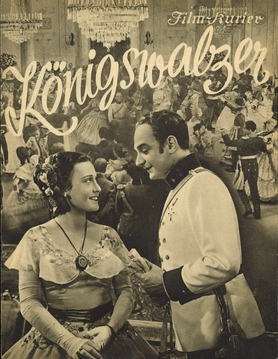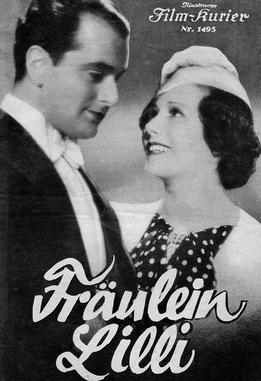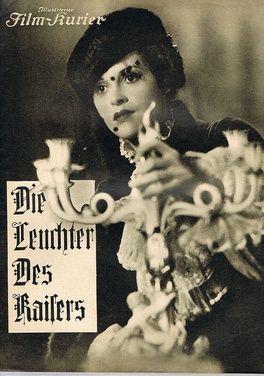Related Research Articles

The Royal Waltz is a 1935 German musical film directed by Herbert Maisch and starring Paul Hörbiger, Curd Jürgens, and Carola Höhn. It was shot at the Babelsberg Studios of UFA in Berlin. The film's sets were designed by the art directors Robert Herlth and Walter Röhrig. A separate French-language version Royal Waltz was also released. It was remade in 1955 under the same title.
Eduard Kaiser was an Austrian painter and lithographer, as was his brother Alexander Kaiser (1819–1872). He was a celebrated portrait artist who drew the attention of Elisabeth, Empress of Austria.
Ludwig II is a 1922 Austrian silent historical film directed by Otto Kreisler and starring Olaf Fjord, Thea Rosenquist and Eugen Preiß. It is a biopic, based on the life of the 19th-century Bavarian monarch Ludwig II.

Fräulein Lilli or Miss Lilli is a 1936 Austrian comedy film directed by Hans Behrendt, Robert Wohlmuth and Max Neufeld. It starred Franciska Gaal, Hans Jaray and S.Z. Sakall. It was Gaal's last European film, although she did briefly start work in 1946 on Renee XIV, before it was abandoned during filming.
The Duke of Reichstadt is a 1920 Austrian silent film directed by Hans Otto and starring Rainer Simons, Käthe Schindler and Maria Mindzenty.

With Heart and Hand for the Fatherland is a 1915 Austrian silent war drama film directed by Jacob Fleck and Luise Fleck and starring Hubert Marischka, Hermann Benke and Liane Haid. The composer Franz Lehár, better known for his operetta, created a score to accompany the film during screenings.
With God for Emperor and Empire is a 1916 German silent war drama film directed by Jacob Fleck and Luise Fleck and starring Hermann Benke and Liane Haid. The celebrated operetta composer Karl Michael Ziehrer wrote a score to accompany the film at screenings.
The Vagabonds is a 1916 Austrian silent comedy film directed by Jacob Fleck and Luise Fleck and starring Josef König, Liane Haid and Marietta Weber. The film's score was based on the operetta of the same name composed by Karl Michael Ziehrer.
The Woman in White is a 1921 Austrian silent drama film directed by Max Neufeld and starring Liane Haid, Dora Kaiser and Eugen Neufeld. It is based on the 1860 novel The Woman in White by Wilkie Collins.
Rigoletto or The King Amuses Himself is a 1918 Austrian silent historical film directed by Jacob Fleck, Luise Fleck and starring Wilhelm Klitsch, Hermann Benke and Liane Haid. It is based on the 1832 play by the French writer Victor Hugo. To recreate the look of Paris in the early sixteenth century, location shooting took place at the neo-Gothic Vienna City Hall.
Don Cesar, Count of Irun is a 1918 Austrian silent historical film directed by Jacob Fleck and Luise Fleck and starring Max Neufeld, Grit Haid and Karl Ehmann. It is based on the opera Don César de Bazan by Philippe Dumanoir and Adolphe d'Ennery, based on an earlier work by Victor Hugo. It was made and released during the closing stages of the First World War.
Eva, The Sin is a 1920 Austrian silent drama film directed by Jacob Fleck and Luise Fleck and starring Liane Haid, Max Neufeld and Karl Ehmann.
Dora Kaiser (1892-1972) was an Austrian film actress of the silent era. Originally trained as a dancer, she began her career on stage before making her film debut in 1918. When Austria's leading film star Liane Haid left Wiener Kunstfilm, Kaiser replaced her in the company's films.

The Stain of Shame is a 1917 Austrian silent drama film directed by Jacob Fleck and Luise Fleck and starring Liane Haid, Karl Ehmann and Anton Tiller.
The Tales of Hoffmann is a 1923 Austrian silent film directed by and starring Max Neufeld. The film also features Karl Ehmann, Eugen Neufeld and Robert Valberg.

House of Pleasure is a 1969 historical comedy film directed by Franz Antel and starring Teri Tordai, Claudio Brook and Margaret Lee. It is the third in the series of films which began with The Sweet Sins of Sexy Susan (1967).

The Emperor's Candlesticks is a 1936 Austrian historical adventure film directed by Karl Hartl and starring Sybille Schmitz, Karl Ludwig Diehl and Friedl Czepa. It is an adaptation of Baroness Orczy's 1899 novel The Emperor's Candlesticks. A Hollywood film version of the story The Emperor's Candlesticks was released the following year.

Schweik's Awkward Years or Schweik's Years of Indiscretion is a 1964 Austrian comedy film directed by Wolfgang Liebeneiner and starring Peter Alexander, Rudolf Prack and Gunther Philipp. It is based on the novel The Good Soldier Schweik by Jaroslav Hasek.

The Emperor's Sweetheart is a 1931 German historical musical comedy film directed by Hans Tintner and starring Liane Haid, Walter Janssen and Wilhelm Bendow. It was shot at the Grunewald Studios in Berlin. The film's sets were designed by the art director Max Heilbronner. An operetta film, it is based on the stage operetta of the same title composed by Emil Berté. It was distributed by the German branch of the American company Fox Film.

Our Emperor is a 1933 Austria period comedy film directed by Jacob Fleck and Luise Fleck and starring Karl Ehmann, Alfred Neugebauer and Susi Lanner. It takes place during the reign of Franz Joseph I of Austria. Location shooting took place in Bad Ischl and at the Burgtheater and Lainzer Tiergarten in Vienna.
References
- ↑ Von Dassanowsky, p. 36.